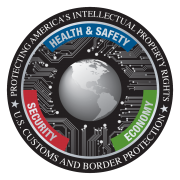Trade in counterfeit and pirated goods threatens America’s innovation economy, the competitiveness of our businesses, the livelihoods of U.S. workers, and, in some cases, national security and the health and safety of consumers.

Trade in these illegitimate goods is associated with smuggling and other criminal activities, and often funds criminal enterprises. CBP Trade protects the intellectual property rights of American businesses, safeguarding them from unfair competition, and use for malicious intent while upholding American innovation and ingenuity.
CBP targets and seizes imports of counterfeit and pirated goods, and enforces exclusion orders on patent-infringing and other IPR violative goods.
Intellectual Property Rights Fiscal Year 2023 Seizure Statistics
U.S. Customs and Border Protection (CBP) and U.S. Immigration and Customs Enforcement (ICE)-Homeland Security Investigation (HSI) seized 19,522 shipments containing goods that violated Intellectual Property Rights (IPR) in Fiscal Year (FY) 2023, which equates to nearly 23 million counterfeit goods. The total estimated manufacturer’s suggested retail price (MSRP) of the seized goods, had they been genuine, was over $2.75 billion (USD). In FY 2023, ICE-HSI arrested 434 individuals, obtained 327 indictments, and received 206 convictions related to intellectual property crimes.
Wearing Apparel/Accessories topped the list for number of seizure lines with 26,891 representing 26.2 % of all IPR seizures. However, Watches/Jewelry were the top products seized in terms of total MSRP value with seizures valued at over $1 billion (USD), representing 38.4% of the total. Handbags/Wallets came in second with an estimated value of over $658 million (USD), corresponding to approximately 23.9 % of the total value of goods seized due to intellectual property rights violations.
E-commerce is a growing segment of the economy in the United States. In FY 2023, CBP processed over 1 billion de minimis shipments (shipments valued at under $800). CBP has been working to improve trade risk management in the e-commerce environment by working closely with the trade community and operating two test pilot programs, the Section 321 Data Pilot and the Entry Type 86 Test. In FY 2023, CBP received 785.7 million filings on de minimis shipments (162.5 million Section 321 Data Pilot; 623.1 million Entry Type 86). The Entry Type 86 filings accounted for over 60% of all de minimis shipments. For more information about e-commerce and the related pilot programs, please visit www.cbp.gov/trade/basic-import-export/e-commerce.
The People’s Republic of China remained the primary source economy for counterfeit and pirated goods seized, accounting for a total estimated MSRP value of over $1.81 billion (USD) or approximately 65.9 % of the total MSRP value of all IPR seizures. Select the Seizure Statistics Reports to see the latest report.


